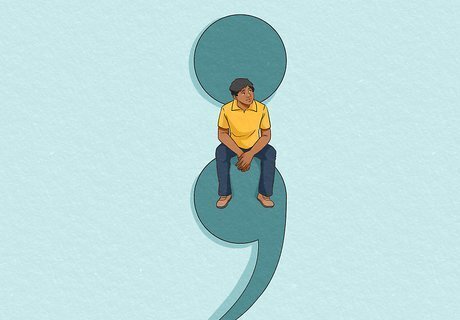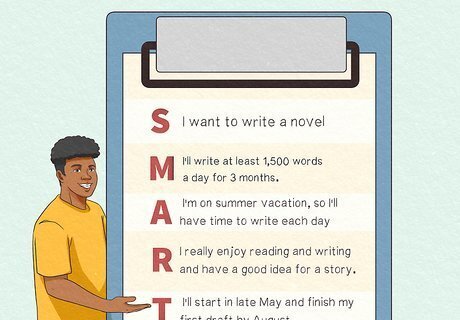
views
- Some ways to identify your strengths include reflecting on past performance, jobs, and hobbies, asking others what they think you’re good at, and trying new things.
- Improve your confidence by reframing mistakes as learning opportunities and creating goals that are both realistic and measurable.
- Thinking that you're not good at anything may be caused by low self-esteem, unrealistic expectations you’ve set for yourself, or people who overly criticize you.
Finding Your Strengths

Write down the things you know you can do well. You might be feeling like you’re not good at anything simply because you haven’t actually taken the time to sit down and identify your positive qualities. Get out a piece of paper or make a mental list in your head and list out all of the things you think you excel at or have a knack for. Even if you think it’s not that impressive of a skill, write it down! Some examples of positive traits are things like being friendly, empathetic, a good listener, creative, responsible, and enthusiastic. Some skills you might excel at include working in a team, writing, organizing, resolving conflicts, and adapting to changes. If you don’t feel like you’re good at anything and are trying to apply for a job, one tip is to highlight your soft skills. These are things like listening skills, communication skills, and empathy.

Ask your friends and family to list out your strengths. If you find yourself struggling to think of something, it’s almost guaranteed that your friends and family members will have plenty of wonderful things to say about you. Ask them something like, “What do you think I’m good at?” or “What do you think my strengths are?” and take note of what they have to say. Sometimes an outsider’s perspective can reveal things about yourself you never thought of. This can be especially helpful if you’re trying to write a resume that highlights your best qualities.

Look at your past experiences and find patterns. If you’re looking to discover your unique talents and skills, think about things like your past jobs, classes, or volunteer opportunities. Chances are you’ll be able to find at least a couple of things you excelled at while you were in those positions. This is also one way to look at the things that didn’t work and start making an effort to improve them. For example, look through your past resumes to see what you wrote down for your skills. Or, scan through your old report cards and see what subjects you excelled in. These might be the key to discovering a new passion and potential strength.

Try new things. There’s a huge possibility that you still have yet to discover all of your strengths. Every person has a multitude of talents, and doing new things and taking the time to acquire new skills will be the key to uncovering more of your hidden strengths. For example, you might: Sign up for a course that interests you at your local community college. Watch video tutorials to learn a new hobby, such as drawing. Get a part-time job. Learn an instrument. Talk with different people about their interests and hobbies.

Help others. There’s a high chance that you excel at something that someone else may struggle with. If you want to discover your true strengths and skills, take a chance and make an effort to help someone or teach them something you know. This can really help boost your confidence, and you’ll likely end up building great relationships with other people. For example, become a tutor for a subject you understand well and excel at. Or, volunteer through a local non-profit or charity.

Reflect on past feedback you’ve received. Constructive feedback is a great tool to use to locate what areas you excel in and what you need to continue working on. Look back through past performance reviews you’ve received, old assignments, or any other type of feedback you’ve received on things you’ve worked on. Not only will you be reminded of your strengths, but you might also discover potential skills that you can perfect through just a bit of work. For example, an old performance review might reveal that you have really great interpersonal communication skills but can continue to improve your time management. Talk to others around you and get a second opinion on the feedback you’ve received. Feedback can be very subjective, so it never hurts to hear what others have to say about your strengths and areas that can be improved.

Invest time in refining a certain skill. Practice makes perfect! Just because something isn’t one of your main strengths now doesn’t mean that it can’t be in the future. Discovering your strengths can also mean putting in effort to improve your current skills until they become a great asset to you. So if you have a skill or quality you want to improve, be sure to invest time and effort into getting better until you’re satisfied with your progress. Set specific goals for yourself that have actionable steps. When you give yourself a sense of direction, you’ll be more motivated to continue working hard. Gigi Hadid Gigi Hadid, Model & Fashion Influencer Find your superpower and hone it. "My mentality has always been, If I'm not the best at something, then I might as well be the best at something else. I realized that I wasn't going to be an Olympic volleyball player, but I knew I could model at that level."

Learn from someone else. Everyone has their own unique skills and strengths, and each person can teach and learn from one another. If you’re feeling stuck and don’t know what your strengths are, ask someone you know to teach you and introduce you to something new. You might just find something you excel at where you least expected it. For example, ask your friends or family members to teach you a new skill or tell them about things you want to learn to see if they can help. Another idea is to find a mentor who can teach you very specific skills for a job.
What It Feels Like to “Not Be Good at Anything”

You constantly compare yourself to others. When you compare yourself to others, you start to make your life about them rather than about you. Constantly holding yourself to other people’s standards and comparing your skills to theirs can make you feel helpless and like you’re not doing nearly enough. On top of that, you may also develop feelings of ill will or jealousy toward these people. You tell yourself things like, “I wish I were as pretty as her,” “Why can’t I do this as well as they did it?” and “I want their style.” Social media may also be a culprit in your feelings of self-doubt. It’s no secret that people tend to only boast about the highlights of their life, and you might find yourself constantly comparing your life to the glamorous things you see online. Remember: Everyone has something they’re good at. Just because you and another person don’t have the same strengths doesn’t mean you’re not good at anything.

You overly fixate on your mistakes and “failures.” When you’re feeling down on yourself, it can be easy to focus only on the negatives and ignore the positives. If you feel like you’re not really good at anything, you might find yourself constantly ruminating on the mistakes you made in the past, your perceived “failures,” and the things that supposedly make you weaker compared to others. These insecure feelings can also lead to you blaming yourself automatically when things go wrong even if the situation is totally out of your control. You might also find yourself often thinking about your regrets and saying things like, “I wish I had done that” or “I really should’ve taken the chance when I had it.” Remember: Your “mistakes” and “failures” can become learning opportunities. If something doesn’t work out the first time, you can still always try again.

You’re afraid to try new things. When you have low self-esteem and feel like there’s nothing you’re good at, you may be even less willing to try new things because you’re afraid of failing. You might find yourself avoiding starting something new or taking on challenges because you simply don’t think you have the skills to succeed. For example, even if you’re at a job you don’t like, low self-esteem might prevent you from going out and finding a better job because you automatically assume you won’t be good at it. Remember: It’s highly unlikely you’ll be perfect at something on your first try. One of the best things about trying new things is that you get to learn along the way and improve your skills.

You feel like you have no direction in life. If you feel like there’s nothing you’re particularly good at, looking to the future can feel pretty daunting. To you, it might seem like everyone else has something they’re good at and already have everything figured out, but you might just feel like you’re floundering without any specific goal. Remember: There’s no one correct way to live your life, and everyone moves at their own pace. Even if it seems like everyone is running ahead and leaving you behind, remind yourself that you’re just moving at your own speed.
What causes you to think you're not good at anything?

Low self-esteem Having a negative self-image and overall low self-esteem can cause you to be extremely critical of yourself. It can cause you to constantly talk to yourself in a negative way and blame yourself when even the smallest things go wrong. Thinking that everyone is better than you and that you’re not good at anything is a clear sign of low self-esteem. You might also find yourself degrading yourself in front of others or using humor to put yourself down, such as by saying things like, “Sorry, I’m just dumb” or “We all know I’m bad at this.”

Unrealistic expectations Telling yourself that you should be the best and that you should be able to achieve something on the very first try are examples of unrealistic goals that can just end up lowering your confidence. When you fail to meet such unrealistic expectations, you can end up feeling disappointed and go on to judge yourself harshly by saying you’re not good at anything. For example, entering a new job and expecting to pull off tasks perfectly right from day one is an unrealistic expectation. Or, telling yourself that you need to make everyone like you can just end up harming your self-esteem since the reality is that not everyone will always get along.

Self-blame Constantly saying things are your fault can chip away at your confidence and self-esteem. This is especially true if you often blame yourself for situations that aren’t under your control. The more you blame yourself, the more you might view yourself as a failure. For example, you might blame yourself for not doing something the way your boss wanted even though they never specified their wants. Or, you might blame yourself for things going wrong during a trip with your family even though there wasn’t really anything you could do.

High expectations from others When everyone around you expects you to do well and puts pressure on you to succeed, it’s natural for you to also adopt such high (and sometimes unrealistic) expectations. This may be especially true if you grew up in a household with caregivers who had very high expectations and were critical when you didn’t meet them. Unfortunately, you might feel very guilty or ashamed at not being able to meet others’ expectations, and this guilt can transform into self-deprecating thoughts like, “I’m not good at anything.”

Past trauma Unfortunately, traumatic events that happened in the past may lie at the root of your insecurity and negative thoughts. Emotional and physical abuse and neglect during childhood can make a person feel extremely insecure and guilty well into adulthood. Additionally, traumatic events, like losing a loved one, can make a person feel like they’re out of control. For example, caregivers who withheld affection and ignored a your emotional needs can make you feel like you’re not worthy in their eyes.

Mental health issues There’s a possibility that such negative thoughts could be caused by a more serious condition. Low self-esteem is a common symptom in mental health disorders such as depression, anxiety, and bipolar disorder. Of course, low self-esteem isn’t the only symptom of such disorders, so if you believe you might be suffering from a mental health illness, talk to a professional psychologist as soon as possible. Some other symptoms of these 3 disorders include: Depression: Feelings of sadness and/or hopelessness, irritability, lack of energy, trouble concentrating Anxiety: Nervousness, panic, increased heart rate, sleeping issues Bipolar disorder: Manic episodes followed by hypomanic or major depressive episodes
Improving Your Confidence

Refrain from comparing yourself to others. It can definitely seem like something that’s easier said than done, but refraining from comparing yourself to others can do wonders in raising your self-esteem. One way to do this is to appreciate others rather than envy them. For example, instead of saying, “I wish I looked as good as them,” say, “They have a unique style that really works on them.” Instead, compete against yourself and do some self-comparison. For example, compare your past and present self to see how much you’ve grown and changed. The only person you should compare yourself to is yourself! Take a break from social media. Seeing everyone’s posts on Instagram, TikTok, or Twitter can make it hard to stop comparing yourself, especially when they only post the best parts of their lives.

Reframe mistakes as learning opportunities. Work on developing a growth mindset rather than fixating on what you did wrong. Remind yourself that your mistakes don’t define who you are and make an effort to look for things you can learn from each mistake. This can help you build a positive attitude as well as avoid making the same mistakes in the future. For example, if you made a mistake at work, take responsibility for it, then review what happened to see what you can improve for next time. Also be sure to point out the things you did well. Even when you make a mistake, there are still things you likely did well that will continue to help you next time.

Create realistic and measurable goals. If you feel like you’re not good at anything, it might be because you’re putting immense pressure on yourself to fulfill unrealistic goals. Instead of expecting yourself to automatically succeed and be the best, set realistic goals that take your current skills, available time, and resources into account. Most importantly, create actionable steps within these goals that will allow you to track your progress. One tip is to set SMART goals which are specific, measurable, attainable (realistic), relevant, and time-bound. For example, consider this goal about writing a novel: Specific: I want to write a novel. Measurable: I’ll write at least 1,500 words a day for 3 months. Attainable: I’m on summer vacation, so I’ll have time to write each day. Relevant: I really enjoy reading and writing and have a good idea for a story. Time-bound: I’ll start in late May and finish my first draft by August.

Reward yourself for progress and growth. By doing so, you’re reaffirming the idea that your hard work and efforts do pay off in the end. Even if you haven’t reached your final goal yet, pausing every now and then to pat yourself on the back for improving can do wonders to raise your self-esteem and help motivate you to keep moving forward. For example, when you’re working on a project, reward yourself with a break or treat when you complete each section to keep yourself motivated. Reward yourself for the small accomplishments throughout the day as well, such as parking your car successfully, doing a load of laundry, or calling to set up an appointment.

Slow down when you’re feeling upset and think logically. If you have low self-esteem or feel like you’re falling behind, it can be easy to get frustrated when things go wrong, and you might automatically turn to blame yourself. However, this kind of behavior can just end up lowering your confidence even more. Instead, take a step back when things get overwhelming, ask yourself, “Is there anything I can realistically do to change this?” and think about the situation logically. One idea is to keep a journal where you can write down your feelings and experiences. This will give you an opportunity to review the situation again and work through your honest thoughts and feelings. Confide in others and ask for their advice when you’re having trouble. Sometimes an outside opinion can help you see the situation from another perspective.

Talk to yourself using positive language. Oftentimes, the culprit behind our negative thoughts and low self-esteem is the language we use to talk to ourselves. If you find yourself automatically making self-derogatory comments or being overly critical toward yourself, stop and make an effort to change those negative thoughts into positive ones. Use positive affirmations to raise your self-confidence. Tell yourself things like, “I am strong,” “I am capable,” and “I can do anything I set my mind to” every day to give yourself encouragement. Avoid automatically making assumptions about yourself and others. For example, don’t automatically assume that you won’t be good at something or that someone won’t like you. Give everything a chance before you make your decision.

Surround yourself with positive, uplifting people. Sometimes all you need to feel good about yourself is people who will be there to cheer you on and remind you of all of your positive qualities. Spend time with friends and family members who you know will accept you for who you are. Nothing is better for building confidence than being surrounded by people who truly understand you. Another idea is to join organizations and community groups that include people who have similar interests as you so that you can encourage and motivate each other. For example, if you enjoy running, find a group of fellow runners in your neighborhood.

Talk to a therapist. If you feel like you’re having trouble identifying your strengths and feeling more confident, you might find talking to a professional really helpful. When meeting with a therapist, they can offer you a safe space to talk about your honest thoughts and feelings and may have exercises to help you build up your confidence.




















Comments
0 comment